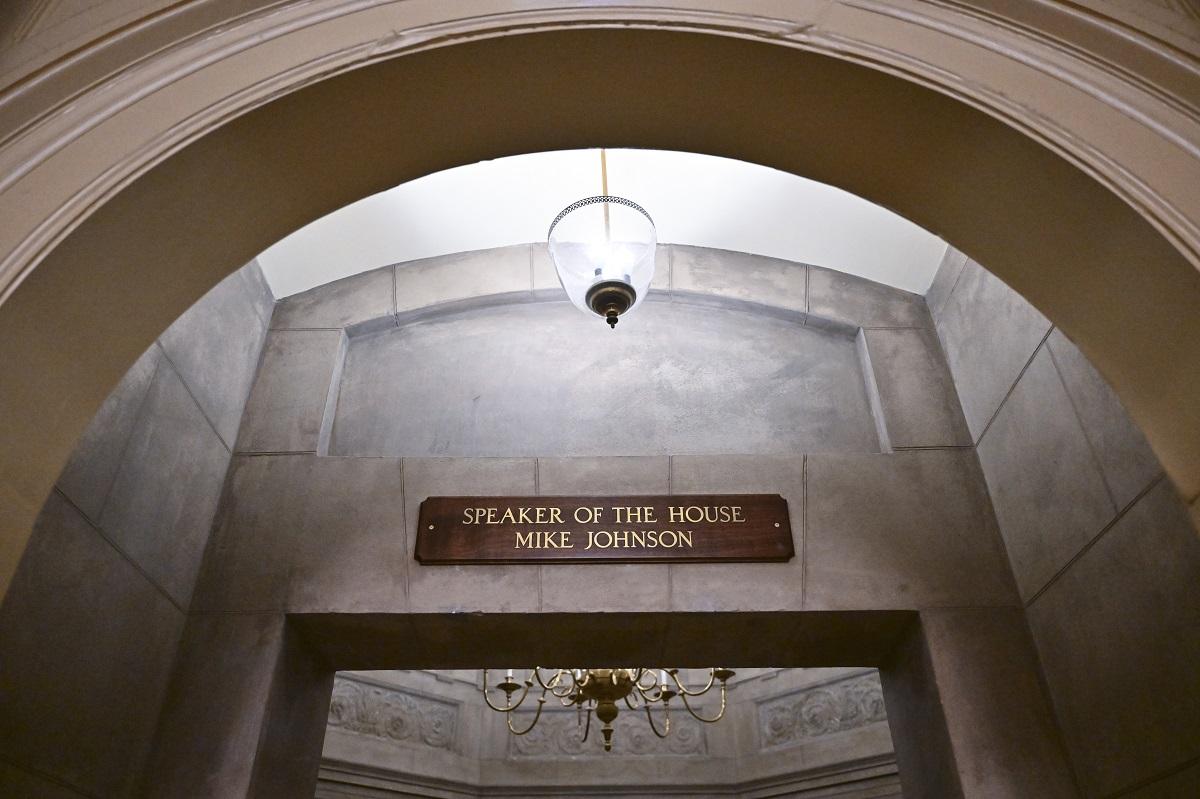
A brand-new sign outside the House speaker’s office on Wednesday afternoon.
12:12 JST, October 26, 2023
Sen. John Thune (R-S.D.) has met him but suggests that he didn’t leave much of an impression.
“I just don’t know him,” the No. 2 Senate GOP leader said of the man who was about to be elected House speaker, a sentiment echoed by many other Republicans.
“You know, I don’t know him,” Sen. Shelley Moore Capito (R-W.Va.) told The Washington Post’s Liz Goodwin.
Finally, Sen. Susan Collins (R-Maine), asked by CNN about working with the deeply conservative constitutional lawyer on government funding issues, confessed she planned to do a Google search to learn who he was.
Had Collins searched at 10:30 a.m. Wednesday, 3 1/2 hours before he was elected to the most powerful post in Congress, “Mike Johnson” would have turned up hits for a “Bachelorette” contestant, the NHL’s retired star of that name, a Mike Johnson in the tech start-up world, as well as one who runs a Toyota dealership in North Carolina and another who’s famous for his steel guitar riffs in country music.
Finally, searchers would have found information about Rep. Mike Johnson (R-La.), the relative newcomer who has never held a position of clout in the House but got elected speaker Wednesday, 23 days after his colleagues expelled the incumbent and three other GOP nominees failed to secure enough support.
Johnson’s rise, putting him second in the line of presidential succession, sets a remarkable precedent in the modern Congress. Not since the 19th century has someone with such a brief tenure – a little more than six years and nine months – been elected speaker.
He has never held a full committee chair’s gavel. His previous leadership post, vice chair of the GOP conference, is not listed among the top five on the official House website. No vice chair has ever ascended to any of the top three slots of speaker, majority leader or majority whip.
And something that should concern the several dozen Republicans in competitive districts: Johnson has basically ignored the fundraising circuit that is so vital to winning close races and retaining the majority.
Since launching his first House campaign in 2016, Johnson raised just $5.5 million for his races; his separate leadership PAC brought in less than $450,000 in the past seven years. His predecessor, Rep. Kevin McCarthy (R-Calif.), by contrast, raised $15.3 million from July through September this year, in all the various committees for which he raised funds.
The promotion came as such a surprise that, in a celebratory speech moments after being sworn in as the 56th speaker of the House, Johnson noted that his wife wasn’t on hand.
“We couldn’t get a flight in time,” Johnson said. “This happened sort of suddenly.”
His speech largely trailed through his personal life as the son of a firefighter in rural Louisiana and his conservative, religious family values. He eventually declared that his top priorities were defending Israel and securing the southwest border, warning of ideological clashes to come while asking for a more cordial environment in the bitterly divided chamber.
“We will defend our core principles to the end,” Johnson said.
Despite his lack of credentials, Johnson, 51, did what no Republican nominee for speaker had done in nearly 13 years: win unanimous support from the GOP side of the aisle.
Johnson might be the speaker that this House Republican Conference deserves, for better or worse. Almost 63 percent of the 221 Republicans took office after John A. Boehner (R-Ohio) resigned under conservative pressure in October 2015.
Johnson took his first oath just a couple of weeks before norm-busting Donald Trump was sworn in as president, and many of those newcomers, emulating the reality-TV star turned president, increasingly fell out of step with veteran GOP speakers such as Boehner and Paul D. Ryan (R-Wis.), who retired at the end of 2018 during a Trump-inspired government shutdown.
Boehner had 20 years in the House, with roles including a committee chairmanship and two stints in senior leadership posts before he became speaker, while Ryan served nearly 17 years, chairing two committees and serving as the 2012 vice-presidential nominee before becoming speaker.
McCarthy spent a decade in various leadership posts under both of those men before becoming Republican House leader five years ago. Even House Majority Leader Steve Scalise (La.) and Majority Whip Tom Emmer (Minn.) hail from the Boehner leadership tree.
Today’s rabble-rousing Republicans no longer see government experience as a value; indeed, some see it as a detriment.
“This is the kind of person we wanted as a speaker,” Rep. Bob Good (Va.), a second-term Republican who voted to oust McCarthy, told reporters after Johnson was elected.
A freshman, Rep. Cory Mills (R-Fla.), came very close earlier this month to supporting the motion to boot McCarthy, supporting a parliamentary move to call up the vote but ultimately voting to keep him around. He is happier now with Johnson wielding the gavel.
“We have a speaker who is constitutionally principled; faith-based as our Founding Fathers had intended; who has not made backroom deals and/or been here 15, 20, 25 years to have developed adversaries as a result of poor legislation, poor policy and personality conflict,” Mills said Wednesday.
Those personality conflicts played out over the last three weeks. Scalise first won the speaker nomination but withdrew a day later as allies of McCarthy and Rep. Jim Jordan (R-Ohio) worked to crush him. Scalise’s friends returned the favor when Jordan got the nomination, and then Jordan’s team tried a political bullying campaign that ended in embarrassing defeat.
On Tuesday, after Emmer bested Johnson by 20 votes for the speaker nomination, a group of Jordan-aligned, far-right conservatives refused to support Emmer, who quickly withdrew from the race.
But Johnson had publicly declared his support for Emmer in a way that Jordan never did for Scalise, leaving some goodwill. Eventually, late Tuesday, House Republicans closed ranks around him, if for no other reason than that Johnson seemed to be a straight shooter without real internal enemies.
The only comparable rise to speaker came 25 years ago, when Newt Gingrich (Ga.) resigned under pressure after a poor GOP performance in the 1998 midterm elections.
Bob Livingston (R-La.), then the chairman of the powerful Appropriations Committee, secured the nomination to become speaker, but he resigned just before Christmas after revelations of a prior marital affair as Republicans were impeaching Bill Clinton over the coverup of his own affair.
Republicans reached down to their chief deputy whip, then-Rep. J. Dennis Hastert (R-Ill.), an appointed post in the leadership ranks. The other leaders, House Majority Leader Dick Armey and Majority Whip Tom DeLay, both Texans, had a long-running feud that made a candidacy by either too toxic.
But Hastert had been in office 12 years and developed an expertise in health policy, as well as serving as a key player in DeLay’s operation. He managed to work pretty well with his leadership team and served eight years – the most stable time of any House GOP majority in the last 30 years.
(Hastert ended up serving 13 months in prison last decade for financial crimes related to covering up a sex abuse scandal when he was a high school wrestling coach.)
What is unclear for Johnson is whether he can oversee a steady leadership team, particularly since both Scalise and Emmer feel as if they were cheated out of the job by far-right lawmakers who refused to accept the election results.
Some of those conservatives pilloried Emmer for his votes to certify President Biden’s victory in the 2020 presidential election, as well as his vote last year to codify the right to same-sex marriage.
In Johnson, they saw the lead author of a legal brief trying to block Biden’s victory and one of the most vocal opponents of gay rights in the House.
After dropping out of contention Tuesday afternoon, Emmer barreled out of the GOP meeting room with a quiet face of rage, storming past reporters and refusing to answer questions. Later that night, he declined to attend the vote nominating Johnson.
But he appeared on the House floor Wednesday, shaking hands with others and loudly voting for Johnson, drawing applause.
Veteran Republicans realize they are taking a chance with Johnson, an untraditional speaker. But they noted how his speech struck the right tone, and they predicted that his most important job would be forging unity while letting others work out gritty policy details.
“Somebody that can bring people together, and that’s really what a speaker, I think, is about,” said Rep. Robert B. Aderholt (R-Ala.), a 27-year veteran.
Sizing up the last three weeks, Johnson acknowledged the “drama” of this month. “But you know what? Through adversity, it makes you stronger,” he said.
“The people’s House is back in business,” he added.
And by 5 p.m. Wednesday, “Mike Johnson” – the new House speaker – ranked in search results above the car dealer, hockey player and reality-TV star of the same name.

Rep. Mike Johnson (R-La.) addresses the media after winning the position of House speaker on Wednesday.
Top Articles in News Services
-

Survey Shows False Election Info Perceived as True
-

Hong Kong Ex-Publisher Jimmy Lai’s Sentence Raises International Outcry as China Defends It
-

Japan’s Nikkei Stock Average Touches 58,000 as Yen, Jgbs Rally on Election Fallout (UPDATE 1)
-

Japan’s Nikkei Stock Average Falls as US-Iran Tensions Unsettle Investors (UPDATE 1)
-

Trump Names Former Federal Reserve Governor Warsh as the Next Fed Chair, Replacing Powell
JN ACCESS RANKING
-

Producer Behind Pop Group XG Arrested for Cocaine Possession
-

Japan PM Takaichi’s Cabinet Resigns en Masse
-

Man Infected with Measles Reportedly Dined at Restaurant in Tokyo Station
-

Israeli Ambassador to Japan Speaks about Japan’s Role in the Reconstruction of Gaza
-

Videos Plagiarized, Reposted with False Subtitles Claiming ‘Ryukyu Belongs to China’; Anti-China False Information Also Posted in Japan

























